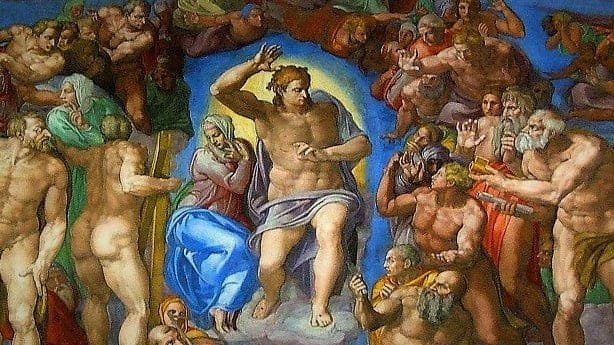DAILY GOSPEL:
JESUS DECLARES ALL FOODS CLEAN (Mk 7: 14-23)

Wednesday, 5th week of Ordinary Time
Jesus summoned the crowd again and said to them, “Hear me, all of you, and understand. Nothing that enters one from outside can defile that person; but the things that come out from within are what defile.”
When he got home away from the crowd his disciples questioned him about the parable. (18) He said to them, “Are even you likewise without understanding? Do you not realize that everything that goes into a person from outside cannot defile, (19) since it enters not the heart but the stomach and passes out into the latrine?” (Thus he declared all foods clean.) (20) “But what comes out of the man, that is what defiles him. From within the man, from his heart, come evil thoughts, unchastity, theft, murder, adultery, greed, malice, deceit, licentiousness, envy, blasphemy, arrogance, folly. (23)All these evils come from within and they defile.”
COMMENTARY TO THE GOSPEL OF ST. MARK
(SCEPTER PUBLISHERS)

- vv 18-19 We know from Tradition that St Mark was the interpreter of St Peter and that, in writing his Gospel under the inspiration of the Holy Spirit, he gathered up the Roman catechesis of the head of the Apostles.
- The vision which St Peter had in Joppa (Acts 10:10-16) showed him the full depth of what Jesus teaches here about food. When he returns to Jerusalem, St Peter himself tells us this in his report on the conversion of Cornelius: “I remembered the word of the Lord” (Acts 11:16). The now non-obligatory character of such prescriptions laid down by God in the Old Testament (cf. Lev 11) would have been something St Peter included in his preaching.
- Our Lord proclaims the true meaning of moral precepts and makes it clear that man has to answer to God for his actions. The scribes’ mistake consisted in concentrating on externals and not giving pride of place to interior purity of heart. For example, they saw prayer in terms of exact recital of fixed forms of words rather than as a raising of the soul to God (cf. Mt 6:5-6). The same thing happened in the case of dietary regulations.
- Jesus avails of the particular cases dealt with in this passage to teach us where to find the true centre of moral action: it lies in man’s personal decision, good or evil, a decision which is shaped in his heart and which then is expressed in the form of action. For example, the sins which our Lord lists are sins committed in the human heart prior to being acted out. In the Sermon on the Mount he already said this: “Every one who looks at a woman lustfully has already committed adultery with her in his heart” (Mt 5:28).
- vv. 20-23 “In order to help us understand divine things, Scripture uses the expression ‘heart’ in its full human meaning, as the summary and source, expression and ultimate basis, of one’s thoughts, words and actions” (St. Josemaria, Christ is passing by, 164).
- The goodness or malice, the moral quality, of our actions does not depend on their spontaneous, instinctive character. The Lord himself tells us that sinful actions can come from the human heart.
- We can understand how this can happen if we realize that, after original sin, man “was changed for the worse” in both body and soul and was, therefore, prone to evil (cf. Council of Trent, De peccato originali). Our Lord here restores morality in all its purity and intensity.
Stay updated: subscribe by email for free TO OUR NEW WEBSITE catholicsstrivingforholiness.org (PUT YOUR EMAIL IN THE SUBSCRIBE WIDGET).
If you need some resources regarding a particular topic, feel free to use the search WIDGET which has access to thousands of posts, categories and tags on Catholic spirituality.
Cordially inviting you as well to follow www.fb.com/Catholicsstrivingforholiness. and share our posts to help more people in their Christian faith and life.
Thanks and God bless you and your loved ones! Fr. Rolly Arjonillo.


